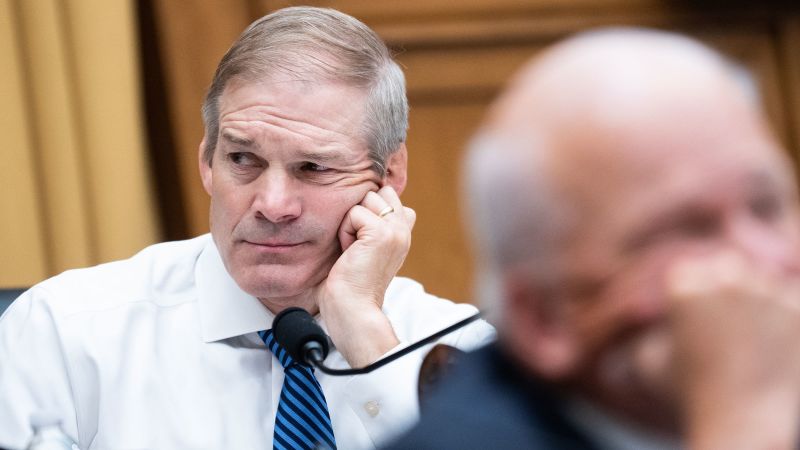CNN
—
When House Judiciary Chair Jim Jordan sat with President Donald Trump at the NCAA wrestling championship in Philadelphia earlier this month, it was only a matter of time before they discussed the party’s brewing effort to impeach federal judges seen as blocking the president’s agenda.
Trump and Elon Musk have publicly pushed GOP lawmakers to impeach federal judges impeding the administration – a call that a number of far-right GOP lawmakers have seized on, introducing impeachment resolutions in the House. But House GOP leadership has signaled in recent days that they don’t have the votes to greenlight the effort and are pursuing other avenues.
That’s, in short, the message Jordan conveyed to the president, telling Trump his committee would be holding a hearing on the federal judiciary in the coming days, according to a source familiar with the conversation.

In the week since, Jordan worked with House GOP leaders on a game plan that prioritized legislation, a commitment to look at the funding for district courts through the appropriations process and public oversight through hearings.
“All three of those options are on the table and we’re going to pursue all three of them,” the Ohio Republican told CNN.
Impeaching judges is exceedingly rare, and the calls to remove the jurists who have ruled against Trump policies have already prompted Chief Justice John Roberts to issue a notable public statement rebuking the rhetoric. It remains to be seen whether Republican leadership’s legislative approach is enough to keep the president and a growing chorus of lawmakers satisfied, or whether the party will ultimately steer itself into a constitutional crisis over the role of the federal judiciary.
Republicans are targeting a number of federal judges who have come in Trump’s crosshairs, including US District Judge James Boasberg, who temporarily blocked the Trump administration’s ability to use a sweeping wartime authority to quickly deport some migrants, and US District Judge Paul Engelmayer, who temporarily restricted Musk’s government efficiency team from accessing a critical Treasury Department payment system.
House GOP Conference Chair Lisa McClain told CNN the “general consensus” inside a recent leadership meeting was for the party to focus on a bill by California Republican Rep. Darrell Issa that would limit the authority of district courts to issue nationwide injunctions. The measure is expected to get a vote in the House this week.
The potential precedent set by impeaching judges has also been a concern. “That’s the slippery slope that you got to be careful of. That’s why we’d rather do it legislatively than the one-offs. I think that’s the strategy,” McClain said.
Issa’s bill, which would end the authority of federal trial court judges to issue orders that extend beyond the parties in a case, comes as some Supreme Court justices, particularly from its conservative wing, have expressed skepticism over how frequently lower courts are issuing nationwide injunctions.
Democrats have previously put forward their own legislative responses to rulings that blocked then-President Joe Biden’s agenda items and other government policies. Those bills were focused largely on the trend of conservative litigants filing lawsuits in single-judge court divisions, all but guaranteeing that the cases would be decided by judges perceived to be sympathetic to the legal claims. But the proposals included efforts to set limits on which courts could consider cases seeking nationwide relief.
The GOP strategy to pivot to a legislative response is in part because House Speaker Mike Johnson conveyed to supporters of the impeachment effort that the conference isn’t fully behind it.
“When I spoke to Speaker Johnson, he told me we didn’t have the votes in the House for impeachment,” said Arizona Republican Rep. Eli Crane, who introduced a resolution to impeach Engelmayer.
One Republican currently resistant to backing the effort is California Rep. Tom McClintock, who serves on the House Judiciary Committee and would oversee any impeachment process.
“I’m waiting for them to show me treason, bribery or other high crimes or misdemeanors,” he said.
Part of the skepticism among House Republicans, including in leadership, is an acknowledgement that even if the conference were able to unify and overcome their narrow majority to impeach a judge, it is very unlikely the Senate would vote to convict given it would require significant Democratic support.
Senate Majority Leader John Thune signaled to reporters earlier this week that he does not think impeaching judges will gain traction: “At the end of the day, there is a process, and there’s an appeals process. And, you know, I suspect that’s ultimately how this will get handled.”
Still, Republicans across the conference are clamoring to lead or sponsor an impeachment resolution in the House, with some 20 GOP lawmakers signing onto Texas Rep. Brandon Gill’s impeachment resolution Boasberg.
House leadership’s current strategy has bought them some time to try and win over the far-right lawmakers who are behind the impeachment effort. But those who need to be convinced told CNN they aren’t ready to let go entirely.
Georgia Rep. Mike Collins, who has signed onto one of the impeachment resolutions, told CNN he was willing to give “a little time, just very little.” But others like Arizona Rep. Andy Biggs seem less willing to abandon the impeachment push. “I think it’s going to happen,” he said. “I think that will continue on.”
And in the meantime, some are making their work to keep the effort alive known to the president.
While talking with the president at the White House last month, Wisconsin Rep. Derrick Van Orden raised his new focus on impeaching a federal judge standing in the way of Musk’s team.
“He said that’s great. Thank you for that,” Van Orden said of Trump.
CNN’s Tierney Sneed contributed to this report.

